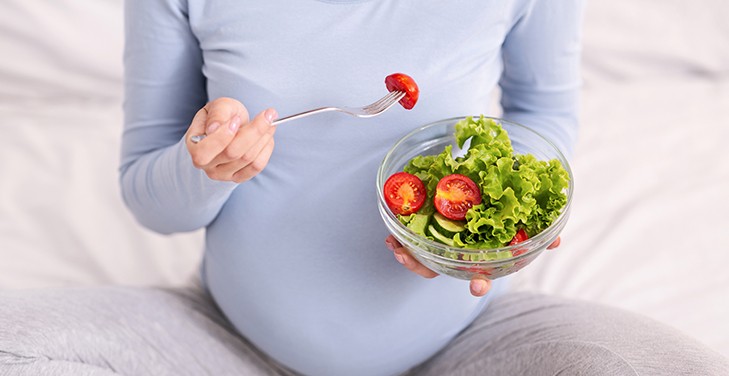Nutrition Tips during pregnancy

Pregnancy “A phase of Birth and Rebirth”- birth of a new life and rebirth of a woman. It starts with foetal development in the womb. This is the crucial time both for the mother and the unborn child, hence need extra special dietary and medical care. The maternal diet has important role in the growth of foetus and in the pregnancy outcome like preeclampsia, hypertension, preterm birth etc. What a mother eat during pregnancy also determines the health conditions of your child during adulthood. So now we can acknowledge how important it is to have NUTRITIOUS DIET DURING PREGNANCY.
For the women getting pregnant for the first time, this time is full of advices including the diet one’s given by our loving Elderlies “Nani and Dadi ki Nuskhe” which are at times really good. But as every woman is different, so the requirement of nutrition is also different in some ways.
Let’s have a look at some of the nutrition tips which can help you plan your healthy and nutrient rich diet during pregnancy.
- Your body is going to support and feed a new life during pregnancy, so the dietary requirements increases both in terms of micro and macro nutrients BUT it doesn’t mean that you have to eat for two. The quality of diet has to be focused rather just the quantity.
- The major micronutrients which need attention at this time are Iron, Folic acid, Vitamin D and Calcium and should be supplemented at relevant times during the pregnancy.
- The macronutrients which mean Carbohydrates, Proteins and Fats have to be gradually increased with the three trimesters of the pregnancy to meet the needs of growing baby and mother. The calorie requirement in first trimester almost remains the same, so focus on nutritionally rich food. The second trimester and third trimester need an additional 350 and 450 calories per day respectively, so increase the quantity of food accordingly.
- Proteins are required for proper growth and development of baby’s organ and mother’s uterine tissue. The requirement would vary with trimester and the weight of the woman. The proteins can be sourced from eggs, chicken, poultry, pulses, legumes, milk and milk products.
- Carbohydrates and fats give calories to your diet, their quality and quantity have to be taken as per individual’s requirement. Incorporate more of complex carbs like oats, millets, whole grains in your daily diet for steady release of glucose. Nuts, chia seeds, avocado can give healthy fats to your body.
- Try to have small frequent meals to avoid any bloating and acidity which is one of the major problems at this time.
- As some females starts experiencing constipation as the pregnancy proceeds, it is advised to include more fiber rich foods in the diet. Focus on good amount of fruits, vegetables, salads, legumes and whole grain cereals like ragi, jowar, whole wheat etc.
- Include iron rich foods as iron is required to increase blood flow and supply oxygen and nutrients to the baby. Have more of green leafy vegetables, lean beef, poultry and eggs. To enhance the absorption of iron, add vitamin C in the form of lemon, citrus fruits with your meals.
- Keep a track of your folic acid in diet by consuming nuts like almonds, dried beans, lentils and eggs.
- For healthy bones and development of internal organs of your child, have good amount of calcium. Eat milk and milk products, dark green leafy vegetables, sea food, shrimp, salmon tuna.
- Many women experience PICA during pregnancy which is craving for clay, cigarette ashes, or starch, or any other strange substances. This might be because of some deficiency of mineral and vitamin, so please consult your doctor for the same.
- Make healthy snack choices for in between meals like fat free yoghurt with fruits, whole wheat crackers, nuts, sprouts etc.
- Limit intake of caffeinated beverages and added sugars.
- Keep yourself hydrated with enough of fluids in the form of water, vegetable or fruit juice and broth every day so that your stool remains soft and you don’t feel constipated.
- Take enough of probiotics found in yogurts that contain active cultures helping good bacteria to grow in the digestive tract.
- Please check for Vitamin D levels. There is a chance of having vitamin D deficiency in your child if you are deficient of this vitamin during pregnancy.
- Light exercise during pregnancy in the form of yoga, walk, stretching is recommended under the guidance of your healthcare provider.
As we know that a woman undergoes a lot physical, emotional and hormonal changes during pregnancy, If you will take good care of your diet at this time, you and your child would definitely remain healthy later in the life.







